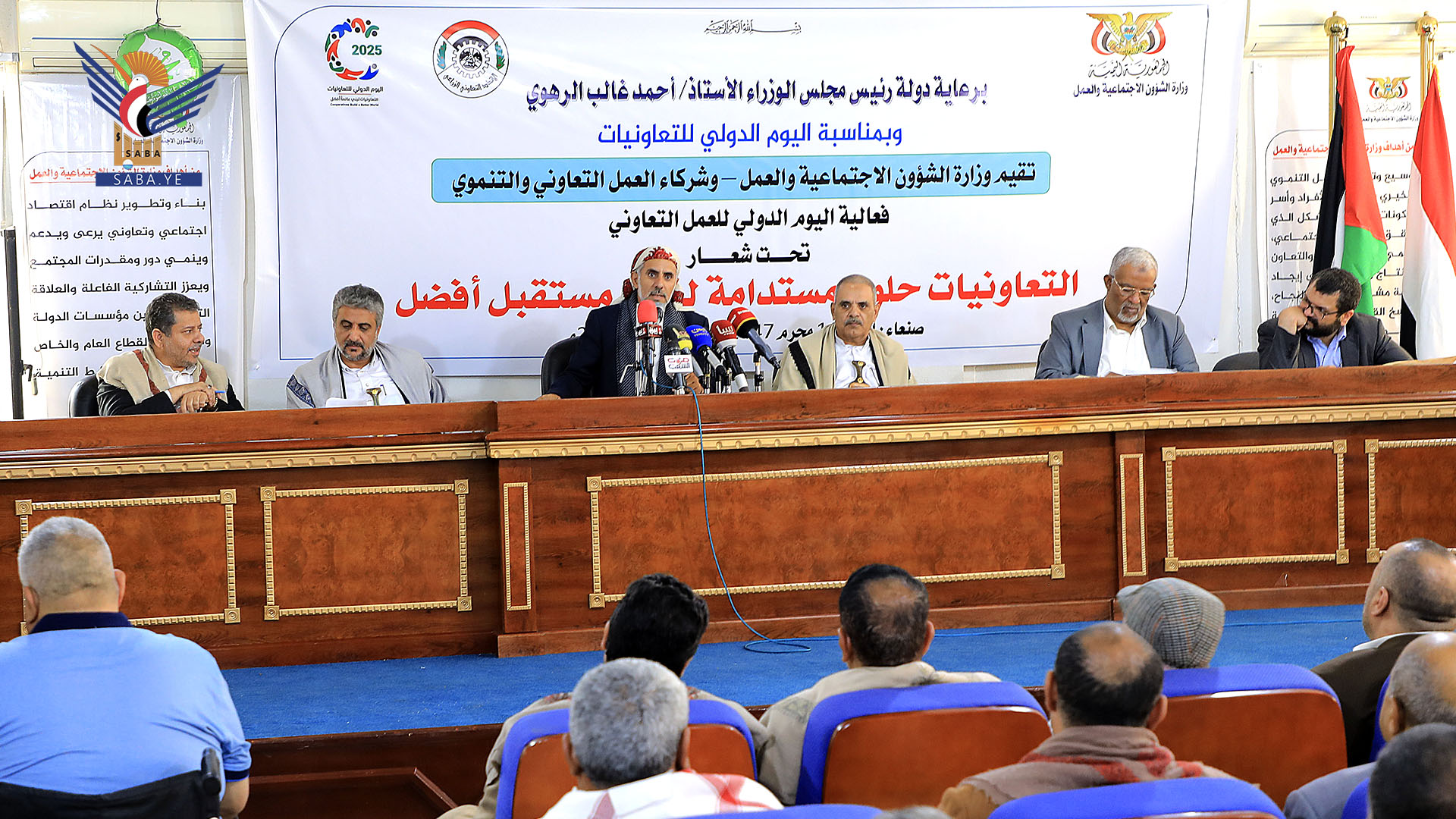Sana'a – Saba:
The Ministry of Social Affairs and Labor organized a commemorative event on Sunday on the occasion of the International Day of Cooperatives, under the slogan "Cooperatives: Sustainable Solutions for Building a Better Future," in collaboration with partners in cooperative and developmental work.
During the event, the First Deputy Prime Minister, Scholar Mohammed Muftah, emphasized the importance of cooperative work in nation-building through expansion in agricultural, industrial, educational, construction, and development fields.
He praised the organization of the event to establish the principles of cooperation as a culture, religion, heritage, and civilizational legacy. He stressed the need to regulate cooperative work legally, morally, and ethically at all levels.
Muftah noted that Yemen is inherently a cooperative society, as evidenced by its collaboration in various aspects of work, such as transforming mountains into agricultural terraces, which expanded Yemen's farmland manyfold.
He called for organizing a conference to activate cooperative work, yielding practical results that reflect the orientations of the Revolution Leader in advancing human development.
He also touched on the anniversary of the Karbala tragedy, which reflected the dangerous deviation in the nation’s history, and drew parallels to the current violations in Gaza, where bloodshed, starvation, and Arab and Islamic inaction persist amid Western and Arab complicity—necessitating cooperation to correct the situation.
Mohammed Al-Durra, Deputy Head of the Shura Council, attended the event, where Deputy Prime Minister and Minister of Local Administration and Rural Development Mohammed Al-Madani commended the Ministry of Social Affairs' efforts in developing cooperative work. He highlighted the significant attention given to cooperatives despite current challenges.
Al-Madani discussed the social and economic role of cooperative associations in development, noting that social affairs offices and cooperatives in provinces manage completed cooperative projects across various fields.
He stressed Yemen’s need to document cooperative efforts, especially during years of aggression and siege, evaluate experiences, and develop them further. He also emphasized the necessity of a cooperative work strategy to adapt to changes and meet needs at all levels.
The event was attended by Dr. Ali Sheiban, Minister of Health and Environment, and Fahd Al-Azzi, Deputy Director of the Presidential Office. Samir Bajjalah, Minister of Social Affairs and Labor, noted that the event coincided with Ashura, urging lessons to be drawn in unity and cooperation to restore the nation’s role in facing current challenges.
Bajjalah affirmed the ministry’s commitment to promoting cooperative principles in social work, highlighting that state leaders' participation reflects their dedication to advancing social work and empowering the ministry.
He urged social affairs offices in provinces to cooperate with local authorities to achieve sustainable development.
Ali Al-Razami, Deputy Minister of Social Affairs for Development, stressed the need for collaborative efforts among partners to elevate cooperatives as a fundamental pillar in societal progress and national economic growth.
He noted the revolutionary leadership and Supreme Political Council’s interest in cooperatives, including establishing productive associations for agricultural supplies, transformative industries, and livestock, while reactivating and correcting previous cooperative projects.
Al-Razami highlighted the ministry’s efforts through workshops for governors , local authorities, developing a model system for multi-purpose cooperatives, and creating a comprehensive database.
The ministry also seeks to complete cooperative legislation, establish a cooperative institute for capacity building, and hold consultative meetings with government bodies and associations to assess the current state of cooperative work.
Mubarak Al-Qaili, Head of the Cooperative and Agricultural Union, emphasized cooperatives' vital role in development and crisis response. He considered the event a key step to advancing cooperative work across fields and expanding production.
He urged associations to seize the opportunity to activate their role, despite challenges such as stalled projects that require collective solutions.

| more of (Local) |




